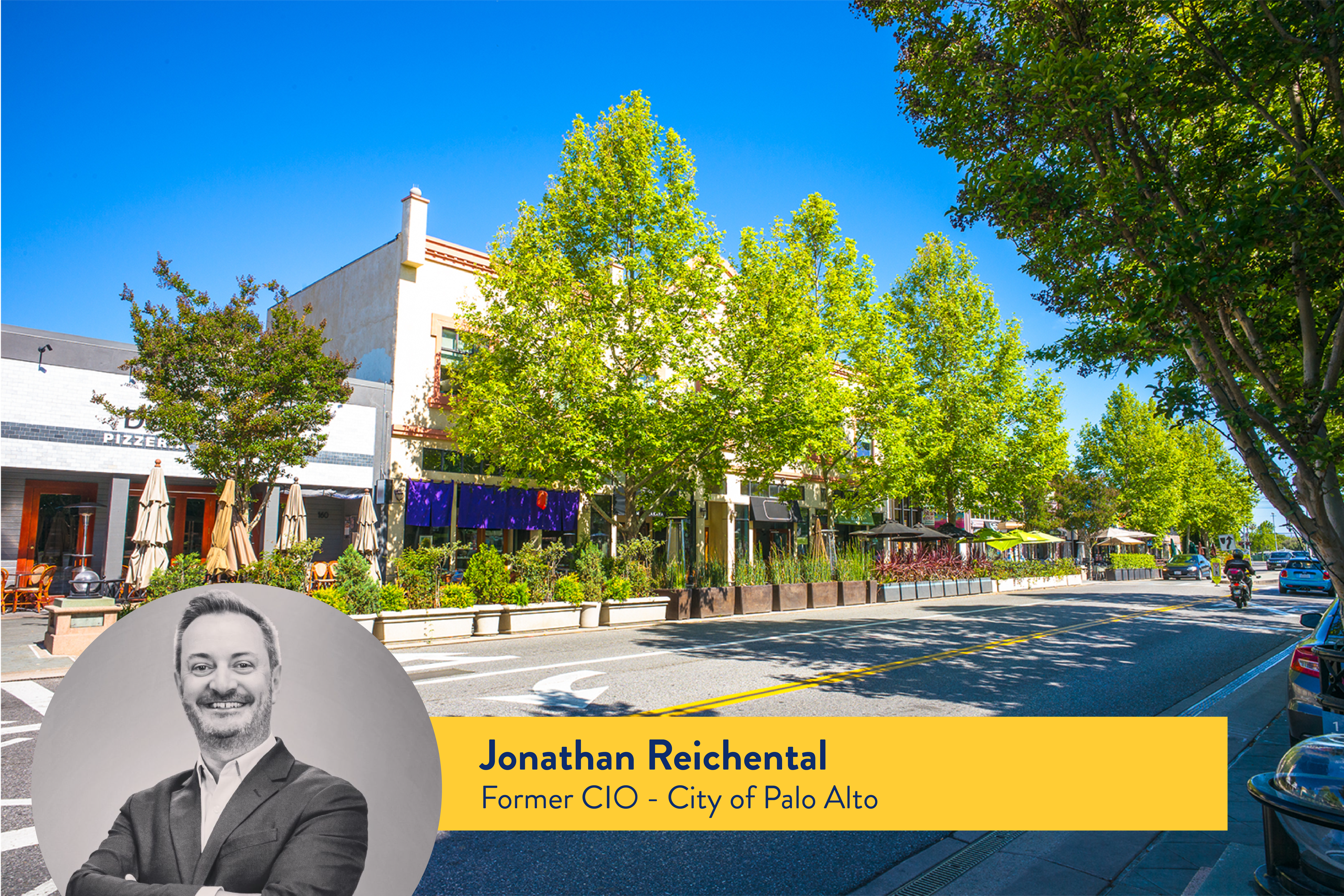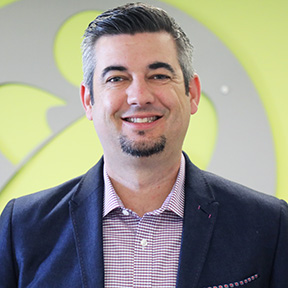
Jonathan Reichental, Former CIO - City of Palo Alto
On this episode of The 3rd Question we talk with Jonathan Reichental, Ph.D. around his thoughts on public challenges, opportunities and his new book.
Video Transcript
Ryan James:
Hello and welcome to The 3rd Question. This is a video interview series with public sector thought leaders from around the country. My name is Ryan James. I'm your host. Today we are lucky enough to be joined by Dr. Jonathan Reichental. He is the CEO of Human Future, a global business and technology advisory and investment firm, but he's also the CIO, or the former CIO, I should say, of the City of Palo Alto in California, where I think he was there for seven years or so. Am I right about that? He's been in the technology space both in the public and private sector for over 30 years.
So, Jonathan, thank you so much for joining us today.
Dr. Jonathan Reichental:
Sure. Thanks for that. Yeah, I'm actually an immigrant. I came to the States almost 25 years ago. Although I find it hard to believe. I came from Ireland, from the beautiful city of Dublin there writing me books.
I go back often. Yeah. I came over here for adventure. I got a green card. I was lucky enough to get a green card. I started working for a big consulting firm. Then I came over to California. I had to come to Silicon Valley. Then one day I got a phone call, and it was from a headhunter and she said, "Jonathan, would you consider going to work for a city as a CIO?"
I could have hung up right then and just said, "No way." Instead, I said ... and I give this advice to everybody, to all people when they're presented with an opportunity, just listen. You never know. Just listen. And so, listening to them, I said, "Tell me more." I went to visit the city and it was Palo Alto, the birthplace of Silicon Valley. I thought, "That's an interesting place to be. Kind of unique. Think differently about the technology to improve the quality of life and deliver services. Palo Alto seems like a good place to do that in." I stayed there for seven years actually.
Then, so it was time for me to think about my next move and the city manager was leaving and the city seemed to be going through sort of a changeover of staff. We had lots of new leaders coming in. I said, "This is a good time for me to sort of be thinking about my next step," and looked at different things. I said, "You know what? I got to create a startup. This is my chance. This is a great window to do that." So created Human Future, which I've been running now for about a year and a half.
Ryan James:
So we're going to go for three questions. It's the name of the series. We try and keep this nice and short, so people can take it in bite sizes as they need be. But my first question for you is this. So, as the former CIO of the City of Palo Alto, which like you said, it was in the heart of Silicon Valley, what were some of the priorities that you had focused on in your time at the organization from an IT perspective? Because of the talent that surrounded you--and we talk about Apple and Google, and Facebook, all of these IT firms--were you able to leverage some of those IT strengths as well?
Dr. Jonathan Reichental:
I mean, it was kind of surprising when I joined the city in 2011. Being the heart of Silicon Valley, the degree to which it hadn't embraced technology in a great way was surprising. So the mission was pretty clear, working with the city manager, we had to come up with a strategy to say, "How can we bring to bear great vendors and technologies and ideas to deliver some of our services in a better way and improve the quality of life for the most people?"
I just wanted to raise the bar a little bit. I wanted to see what we could do to be a flagship for the possibilities of a small to medium sized city in the world. What could you actually do to change the relationship between the community and city hall to make things like transportation better, contribute towards reducing carbon emissions, and a whole range of things.
So I'm always very proud to say in the seven years I was there we delivered almost 275 technology-related projects. One of the big areas was, for example, digitalization. How could we take a lot of the city's paper-based processes and put them on apps and put them online? Not only because people want to work from their phones and their iPads, and their machines. But also they would be quicker due to self-service, and they would be more accurate. We could do better reporting. So, all of that. We converted 60 major Palo Alto processes, 60 major ones to digital. So I'm very proud of that.
One of the apps that is used today is called PaloAlto311, and that's now becoming more of a universal app for the community. So you can do everything from reporting issues to find out how you can recycle, even check up on things like the school system and know how to get a child through the school system in Palo Alto.
Very early on I figured we can try to solve city problems through public-private partnerships, and we can invite the community to help us solve this problem. So we had a lot of hackathons. We had these sort of one- or tw-o, or three-day events where lots of people could participate and try to solve problems. From that, we were able to actually develop many solutions or inspire solutions, or actually gather evidence and use to drive decisions. So they were very successful.
Then finally, I think one of the things we did was I wanted to make sure that my team was inspired by the work that was happening in Silicon Valley. So we would visit sites. I brought the team to Microsoft, brought the team to Google, VMware, on and on. We would go to these places and hear from brilliant people and then come back to the office and we'd all be pumped up and excited.
Ryan James:
There's a lot of smart technology folk everywhere and being able to leverage your community or invite your community to come in, I think you set a good bar for others that they could follow in the same way, and I've seen that happen at other cities too.
Now that you're in this new role outside of the public sector, I know you speak all around the world. I've seen some of the areas where you speak and you're advising public sector organizations, but also IT think tanks or IT groups that are focused on public sector as well.
You're helping with them in an advisory role. I'd love to hear a little more about the new book that's coming out in three or four weeks, it's coming out soon. So with this kind of expansive viewpoint, both inside and outside of the public sector with the people that you talk to, the technology folk that are focused on public sector, what would you say are some of the biggest challenges that the public sector has around technology? Then also on the other side, what are some of the biggest opportunities that the public sector might have?
Dr. Jonathan Reichental:
Sure. Well, you can't answer that question really, without thinking about our global pandemic, which clearly is changing the game. I mean, one of the things that the pandemic does for public sector is it accelerates the adoption of new technologies. So right now it probably sounds a bit like a cliché, but if you haven't heard it before, we're innovating in government. What doing what used to take 10 years in 10 weeks.
Ryan James:
Yeah.
Dr. Jonathan Reichental:
To make the case for VPN as a service applications, or even video conferencing for city people, that was going to take years to get to a better place. Cities all over the world and here in the US have moved quickly. It's been astonishing, actually. I'm very positive. Today, there are even greater expectations from communities around how government performs and how cities deliver.
So the biggest challenge, if I wanted to take sort of a macro view of this is mindset, is government is gradually catching up. There's a new generation of leaders that are now moving into government, whether that's sort of millennial mayors, or millennial city managers who are digital natives, they were born with the internet. They were born with technology. They're getting into government because they love public service and they want to serve. They're saying, "Hey, wait a minute, this doesn't look like the private sector, we need to upgrade." So we need new talent. We need a new mindset that's driving new talent.
The cities that are hiring technologists and data scientists--really good quality project managers and facilitators, and business analysts--those cities are starting to see the dividend of that, the positive dividend. So I'd say there's a talent challenge, right? We need to get the right people into cities. So we've got to create the incentives, and we've got to encourage people to pursue public service. Cost and the expense of running complicated governments, that's a big challenge.
Ryan James:
Yes.
Dr. Jonathan Reichental:
Again, with the pandemic, just trying to make it timely, government coffers are going to suffer. they're not getting near as much revenue. That's an understatement. So where budgets were tight prior to the virus, now they become even tighter. But you know what? Under circumstances like that, we have to become more creative. We have to become more innovative. It's a forcing mechanism. It's a forcing factor for us to think differently.
Transportation is a problem. It's not solved. There are a few cities that don't suffer from significant congestion and everything that goes with it. We're talking about things like light rail. We need more light rail and electric buses and things. So we need better options for transportation.
The biggest problem of all, and there are lots to choose from that I observed is the climate crisis, the climate crisis. Half the planet lives in cities. So what, three, almost four billion humans live in cities? About a billion and a half live in cities that are at risk of flooding.
Ryan James:
Right.
Dr. Jonathan Reichental:
One and a half billion people approximately. A lot of our cities are on coastlines, right?
The scientific consensus is that there is going to be sea level rise, and the storms are going to be worse. Cities can suffer greatly and people will suffer greatly. So we need technology and ideas and leadership around climate change.
The final point I would make is tapped resources. This is something I discovered pretty early on in my time with cities is everything's scarce in cities. There's never enough time. There's too many projects, not enough talent, not enough money. It's all about scarcity. But the one thing that cities have in abundance is data.
I've been saying this for a long time. So for some people that will sound like a broken record, but I want to make that point. If cities utilize the data they have, they can make better decisions, they can embrace partnerships for people to build solutions, and run their cities better. So data is the big advantage that cities have that most are not taking advantage of.
Ryan James:
All right, well, the third question, the third question is Jonathan, we try and make this one a little bit more of a fun question. So if I gave you the DeLorean, which you can see over here over my shoulder. I've got the TARDIS from Doctor Who. I've got the time machine by HG Wells and I also have a little DeLorean right here. If I was going to pick one of those, today I'm going to pick the DeLorean. If I gave you the DeLorean time machine from Back to the Future, and you could go back to any point in your public sector role or life and tell yourself something, or advise yourself something, or change something, what would it be and why?
Dr. Jonathan Reichental:
If only we could do that.
Ryan James:
I know. Right?
Dr. Jonathan Reichental:
The funny answer is I wonder if I would do it again, you know?
Ryan James:
Yeah.
Dr. Jonathan Reichental:
But actually, on balance, I'm very, very happy I did it. So that decision was a good one. I think, to be real clear and add value, I think there's two quick thoughts here. One is, I wish I had got training for a lot of my team sooner. I think we kind of limped along too long before I realized that some of the key skills that my team needed, they didn't have. Had I identified the gaps in the skill sets of my team and filled those quicker. I think that was a major missing piece, that could have made things progress more rapidly.
Ryan James:
That's true.
Dr. Jonathan Reichental:
I think the second thing is, and this can be by the way advice for any organization is make sure you have good project managers and good project management processes. Project management is in many ways the difference between success and failure in everything, whether it's a new strategy, it's revealing a new product in the marketplace, redesigning your offices, or just basically maybe putting in place some new governance. The way you get there is by really good quality project management.
So my book is called Smart Cities for Dummies. It's part of the Dummy series by Wiley, the most successful reference series in history, sold over 300 million books. I'm part of that family now. You can get that book in any bookstore. Of course, you can get it online Barnes & Noble, Amazon, or wherever you can buy it. It's available now for pre-order.
Depending when this video will be shown, it should be shipping around July 6th. My Twitter account, I'm very active on Twitter is @reichental. Just my last name @R-E-I-C-H-E-N-T-A-L. I'd recommend that. I also have a website reichental.com, where you can contact me too. I've got a form there that you can reach out to me, and I'm very active on LinkedIn as well. So very simple to interact. By the way, if you reach out to me, I will respond, be happy to help.
Ryan James:
Great. Well, Jonathan, I appreciate you taking the time to speak with us today, share some of your thoughts. If any of our viewers want to subscribe to The 3rd Question, you go to the3rdquestion.com and subscribe there. We're going to be having these interviews spaced out and coming at a regular cadence over the next ... for who knows how long they'll go! We've got a lot coming. So we're excited about that. So thanks again for your time. Have a great day. Stay safe in today's crazy environment and I really appreciate it.

